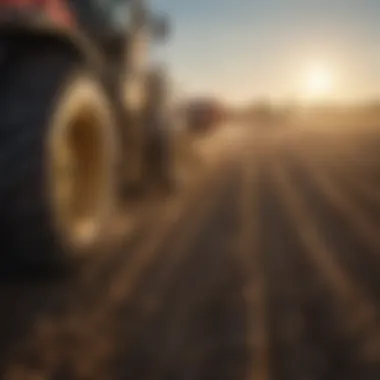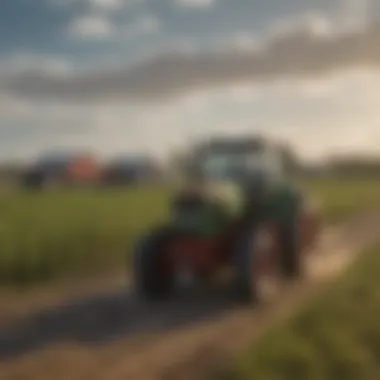Exploring Agricultural Innovation in Grainfield, Kansas


Intro
Better Built Grainfield, Kansas, is an intriguing study in modern agriculture and community vitality. Its agricultural practices showcase a rich heritage interwoven with contemporary challenges. The region's history informs its current methodologies, creating a unique landscape that thrives on sustainable farming.
Understanding the key concepts and terminology specific to this area is essential for anyone delving into its agricultural practices. Terminology like sustainable farming, crop rotation, and community-supported agriculture carries significant weight in shaping both the local economy and social structures. This article will navigate through these elements, dissecting agricultural innovations, community initiatives, and socio-economic implications.
In examining these facets, we will reveal how Better Built Grainfield emerges as a model of excellence amidst the complexities of modern agriculture. It is crucial to consider not only the historical context but also current trends and innovations that can impact farmers and enthusiasts looking to enhance their practices.
As we investigate these themes, we will also highlight practical applications and troubleshooting mechanisms to aid in the implementation of new strategies. The ultimate goal is to offer profound insights into the sustainability practices that define Better Built Grainfield.
Foreword to Better Built Grainfield, Kansas
In the heart of Kansas lies an area renowned for its agricultural significance and rich local history. Better Built Grainfield is more than just a geographical location; it symbolizes the intersection of tradition and innovation in farming practices. Understanding this community is essential, as it serves as a model for both sustainable agricultural methodologies and dynamic community engagement.
Geographically, this region possesses unique characteristics that influence its crop and livestock production. The climate, soil type, and local water sources play vital roles in determining what types of farming are most effective here. Moreover, the historical background of Grainfield demonstrates how its residents have adapted to both challenges and opportunities throughout the decades.
As we explore this examination, we will delve into the practicalities of how regional identity shapes agricultural choices. The challenges faced by local farmers are paralleled by innovative solutions being implemented. This duality not only highlights the importance of adaptability in farming but also reflects the rich narrative of the area's past.
This discussion is particularly relevant given the contemporary emphasis on sustainable practices in agriculture. As farmers and agricultural enthusiasts look for inspiration and guidance, Better Built Grainfield stands out for its commitment to blending historical insights with modern techniques.
Geographical Overview
Grainfield is situated in Gove County, Kansas, a region characterized by its flat plains and expansive fields. The area experiences a continental climate, marked by hot summers and cold winters, which affects both the type of crops grown and livestock raised. Rainfall is often scarce, making irrigation an important practice for maintaining crop health.
The landscape is predominantly agricultural, with vast stretches of land dedicated to growing wheat, corn, and other grains. The soil here consists mainly of fertile loam, which lends itself well to crop production. The geographical setting not only lends a picturesque view but also provides essential resources such as water from the Smoky Hill River, essential for irrigation.
Historical Background
The history of Better Built Grainfield is rich and complex. Established in the late 19th century, the area originally attracted settlers drawn by the promise of fertile land and economic opportunity. Over the years, the community has undergone significant transformations, influenced by agricultural trends and technological advancements.
The establishment of the railroad in the early 1900s marked a turning point for Grainfield. It allowed for easier access to markets and spurred economic growth. Many local families have farmed the same land for generations, passing down knowledge and techniques that hold a deep-rooted significance in the community. Today, this historical lineage is often celebrated in local events and educational initiatives aimed at preserving Grainfield's agricultural heritage.
"Grainfield is not just a place; it embodies the resilience and pioneering spirit of its people."
As we continue to examine Better Built Grainfield, Kansas, the intersection between geography and history will become evident as a key factor contributing to its current agricultural landscape.
Agricultural Landscape
The agricultural landscape of Better Built Grainfield, Kansas, serves as a vital component of its identity and economic viability. This region is characterized by rich soil, a favorable climate, and innovative farming practices that contribute to its reputation as a hub for agricultural production. Understanding this landscape helps demonstrate how it supports both the local community and the broader economy.
Crop Production
Crop production in Better Built Grainfield reflects a blend of traditional techniques and modern practices. The area's fertile fields are primarily dedicated to planting crops like wheat, corn, and soybeans. These staples not only play a crucial role in the local economy, but they also contribute significantly to the national food supply. Farmers in this region engage in crop rotation to enhance soil nutrients, reduce pest pressures, and improve overall yield.
Implementing sustainable practices such as no-till farming and cover cropping are becoming more common among local farmers. These methods help maintain soil health and reduce erosion, which is essential for long-term productivity. The integration of technology, such as precision farming tools, allows farmers to analyze and optimize their input use, leading to better crop performance and reduced environmental impact.
Livestock Management
Livestock management is another critical aspect of the agricultural landscape in Better Built Grainfield. Dairy cows, beef cattle, and poultry are predominant. Managing these animals requires careful attention to their health and well-being, as well as considerations for feed quality and environmental conditions.
Local farmers often utilize pasture-based systems, which promote animal welfare and sustainable grazing practices. This approach not only benefits the animals but also enhances soil health through natural fertilization. The demand for locally sourced meat and dairy products continues to rise, encouraging farmers to adopt more sustainable practices and improve the genetics of their herds.
"Sustainable livestock farming ensures food security while minimizing environmental impact."
Innovative Farming Techniques


Innovative farming techniques are reshaping the agricultural practices in Better Built Grainfield. Farmers are increasingly embracing technology to improve efficiency and productivity. For example, the use of drones has gained popularity for crop monitoring and health assessment, which enables farmers to make data-driven decisions.
Moreover, implementing vertical farming systems allows for year-round production of fresh produce, even in a climate that may face harsh conditions. This adaptation not only helps meet local demand but also mitigates transportation costs and greenhouse gas emissions.
In summary, the agricultural landscape of Better Built Grainfield encompasses traditional and modern practices. By focusing on sustainable crop production, responsible livestock management, and innovative techniques, the region stands as a model for agricultural excellence amid modern challenges.
Sustainability Practices
Sustainability practices in agriculture encompass a range of approaches that prioritize environmental health, economic viability, and social equity. In Better Built Grainfield, Kansas, these practices are essential not only for maintaining the local ecosystem but also for ensuring the resilience of the farming community in the face of ongoing challenges. The incorporation of sustainable methods offers numerous benefits that can significantly influence both the immediate agricultural landscape and broader societal outcomes.
Soil Health Management
Healthy soil is the foundation of successful farming. It is essential for crop yield, nutrient availability, and overall ecosystem balance. In Better Built Grainfield, farmers implement various soil health management techniques including crop rotation, cover cropping, and reduced tillage. These practices enhance soil structure and boost organic matter levels.
- Crop Rotation: Growing different crops in a sequential manner helps break pest cycles and improves soil fertility. By alternating deep-rooted and shallow-rooted plants, farmers can utilize nutrients more effectively.
- Cover Cropping: Planting cover crops during off-seasons protects soil from erosion and compaction. They also suppress weeds, improve soil moisture retention, and enhance microbial activity.
- Reduced Tillage: Minimizing tillage practices reduces soil disturbance, which helps maintain soil integrity and health. This is crucial in preventing nutrient loss and supporting soil organisms.
These strategies are often highlighted for their effectiveness in maintaining soil health while ensuring productivity. Farmers in this region recognize that soil management goes beyond the immediate output; it fosters long-term sustainability and agricultural resilience.
Water Conservation Strategies
Water is a critical resource in agriculture, making conservation efforts vital to farming practices. Efficient water use not only preserves regional water supplies but also enhances crop production in arid conditions. In Grainfield, effective water conservation strategies include drip irrigation, rainwater harvesting, and soil moisture monitoring.
- Drip Irrigation: This system delivers water directly to the plant roots, minimizing evaporation and runoff. It ensures that crops receive just the right amount of moisture, which reduces water waste and optimizes growth.
- Rainwater Harvesting: Collecting and storing rainwater can supplement irrigation needs. This approach helps lessen the reliance on groundwater and provides an eco-friendly alternative.
- Soil Moisture Monitoring: With modern technology, farmers can utilize moisture sensors to gauge the moisture levels in the soil. This data-driven approach allows for more precise watering schedules, further conserving water.
Water conservation in agriculture creates a sustainable balance between crop needs and environmental support. Adoptig such strategies is imperative, especially as climate challenges continue to evolve.
Pest Control Solutions
Effective pest control is critical to sustaining agricultural productivity. Farmers in Better Built Grainfield utilize integrated pest management (IPM) approaches that emphasize sustainable and environmentally responsible practices. This holistic strategy reduces over-reliance on chemical pesticides and fosters a healthier agricultural ecosystem.
- Cultural Practices: These involve altering farming practices to reduce pest infestations. This includes selecting pest-resistant crop varieties and managing field sanitation.
- Biological Control: Introducing natural predators or parasites can help regulate pest populations. Using beneficial insects like ladybugs or deploying nematodes can be effective in controlling harmful pests.
- Mechanical Control: Using traps and barriers can physically prevent pests from damaging crops. This strategy reduces the need for chemical interventions.
Through these pest control solutions, farmers protect their crops while minimizing ecological impact. These practices exemplify how responsible farming not only supports immediate agricultural goals but also nurtures the environment for future generations.
"Sustainability practices are not just a trend but a necessity for the longevity of agriculture in Grainfield."
Technological Advancements
Technological advancements play a pivotal role in modern agriculture, specifically in Better Built Grainfield, Kansas. This sector benefits substantially from innovative methods that enhance productivity, reduce costs, and promote sustainability. The integration of advanced technologies into farming practices is not merely a trend; it is a necessity for adapting to contemporary challenges. This section explores the different facets of technological advancements in the region, particularly focusing on precision agriculture and the use of drones in farming.
Precision Agriculture
Precision agriculture involves the use of technology to monitor and manage field variability in crops. This approach is increasingly utilized in Better Built Grainfield, allowing farmers to enhance efficiency and yield. Key features of precision agriculture include:
- Data Collection: Sensors and satellite imagery are utilized to gather data on soil health, moisture levels, and crop conditions. This information helps farmers make informed decisions.
- Resource Management: With precise information, farmers can optimize the use of fertilizers and pesticides, applying them only where needed. This practice not only saves costs but also mitigates environmental impact.
- Yield Monitoring: By analyzing crop yields in real-time, farmers can identify underperforming areas and adjust their practices accordingly. This leads to better harvests over time.
The benefits of precision agriculture are significant. Increased efficiency results in higher profitability, and the sustainable practices associated with it contribute positively to the community and environment.
Use of Drones in Farming
Drones have emerged as a game changer in various agricultural processes, providing unique benefits to farmers in Better Built Grainfield. They serve multiple purposes, improving operational efficiency significantly. Some of the applications of drones in farming include:
- Field Surveying: Drones can quickly survey large areas, capturing high-resolution images that assist in crop monitoring and assessment. This reduces the time and labor cost compared to traditional methods.
- Crop Spraying: Drones can efficiently apply fertilizers or pesticides, ensuring even coverage and minimizing waste. The use of drones for spraying is becoming more common, particularly in hard-to-reach areas.
- Data Analysis: Utilizing drones allows for the collection of vital information that can be analyzed to make better farming decisions. This includes everything from crop stress indicators to mapping field drainage.
In summary, the implementation of drones in agriculture is proving to be both a time-saver and an economic boost, contributing to overall efficiency in farming.


Embracing these technological advancements ensures that Better Built Grainfield remains not only competitive but also a model for agricultural excellence.
Economic Impact
The economic impact of agricultural practices in Better Built Grainfield, Kansas, extends beyond mere statistics. It influences the livelihoods of residents and shapes the future of the community. Understanding this impact allows stakeholders to make informed decisions about resource allocation, education, and investment in the region's agricultural future.
Market Trends and Pricing
Market trends in Better Built Grainfield play a critical role in shaping the pricing strategies for local farmers. Recent years have seen fluctuations in crop prices, largely influenced by both domestic and global demand.
Factors such as weather patterns, consumer preferences, and international trade agreements significantly affect these trends. Farmers must stay vigilant to adjust their tactics accordingly. A few key factors that determine market dynamics include:
- Supply and Demand: Seasonal changes can lead to overproduction or shortages, significantly impacting price.
- Global Market Influences: International demand can increase the value of local crops, creating opportunities for export.
- Consumer Trends: A growing preference for organic and locally sourced products influences pricing structures.
These elements necessitate a robust understanding of market conditions for effective pricing. As such, continuous education is vital for farmers to adapt to evolving market strategies and maintain profitability.
Impact on Local Businesses
Local businesses in Better Built Grainfield also feel the reverberations of the agricultural economy. Farming practices not only determine the success of individual farms but also significantly influence the local economic landscape. Businesses such as cooperatives, supply stores, and related services see changes in consumer demand based on agricultural output.
Moreover, strong agricultural activity encourages the growth of ancillary sectors. Enhancements to the local infrastructure further support this growth. Key impacts include:
- Job Creation: The agriculture sector generates jobs in various fields, from production to marketing.
- Increased Spending: Successful farms contribute to increased disposable income, which benefits local eateries, retailers, and service providers.
- Investment Opportunities: Positive economic indicators attract both local and outside investors seeking to support or expand farm-related operations.
Effective agricultural practices thus ripple through the entire community, underscoring the interconnectedness of farming and local economies.
Community Engagement
Engagement within communities is a vital aspect of growth and sustainability, especially in agricultural settings like Better Built Grainfield. It involves not only fostering relationships among local residents but also creating a framework where collaboration and shared goals can flourish. A strong community engagement strategy can lead to numerous benefits, including improved morale, increased participation in local initiatives, and a deeper connection to agricultural practices.
Community engagement serves as a bridge between farmers, residents, and local organizations. It allows for the exchange of ideas and ensures that everyone has a stake in the area’s agricultural future. Through robust community ties, local farmers can advocate for policies that support sustainable practices, while residents become more informed about the challenges and triumphs facing their agricultural neighbors.
“A community that works together produces more than crops; it cultivates resilience.”
Local Initiatives
Local initiatives play a pivotal role in enhancing community engagement. Programs focused on shared agricultural practices, farmer's markets, and community-supported agriculture (CSA) schemes enable connections between producers and consumers. In Better Built Grainfield, these initiatives often draw active participation from different age groups, fostering a culture of collaboration and mutual support.
Some standout examples of local initiatives include:
- Farmers' Markets: These provide a space where local farmers can sell their produce directly to consumers, ensuring fair pricing and freshness.
- Community Gardens: Such gardens inspire teamwork and yield food for those in need while educating participants about sustainable practices.
- Agricultural Festivals: These events celebrate local produce and help build community pride, allowing farmers to showcase their work.
Each initiative reinforces the importance of shared resources and learning experiences, emphasizing the community's role in sustainable agriculture.
Education and Training Programs
Education and training programs are crucial for community engagement in Better Built Grainfield. They equip farmers with the knowledge and skills necessary to adapt to modern challenges while preserving their agricultural heritage. Such programs can cover a range of topics, from innovative farming techniques to sustainable pest management strategies.
Organizations like the local cooperative extension often run workshops and training sessions, bringing together farmers to discuss current agricultural trends and best practices. Topics regularly addressed include:
- Sustainable Farming Techniques: Practical sessions on crop rotation, soil health, and pest control to promote environmental sustainability.
- Financial Management Skills: Training on managing farm finances, grants, and subsidies to help improve profitability.
- Technology in Agriculture: Workshops focused on the application of technology such as precision agriculture and data analysis tools.
By emphasizing education, Better Built Grainfield empowers its agricultural community to innovate while remaining grounded in sustainable practices. Encouraging continuous learning promotes adaptability and ensures local farmers remain competitive in an evolving market.
Challenges Faced


The agricultural landscape of Better Built Grainfield, Kansas, encounters several formidable challenges that impact its sustainability and productivity. Understanding these challenges is essential for farmers, policy makers, and community members alike. Addressing issues such as climate change effects and economic pressures enables proactive measures that foster resilience in farming practices and the local economy.
Climate Change Effects
Climate change poses significant risks to the agricultural productivity in Better Built Grainfield. The increasing unpredictability of weather patterns leads to inconsistent rainfall and extreme temperatures. Farmers face difficulties in planning and executing their cultivation strategies. Factors such as drought can severely reduce crop yields and impact water supply for livestock management. Moreover, changing seasonal patterns may result in increased incidences of pests and diseases, further threatening both crops and livestock.
The adaptation to these environmental shifts requires innovative solutions. Farmers are encouraged to explore resilient crop varieties that can withstand harsh conditions and to implement adaptive management techniques that utilize available resources efficiently. In this sense, community forums and agricultural workshops play a crucial role in disseminating knowledge about climate-smart agriculture.
"Climate change is not just a distant threat; its effects are here and now, challenging the livelihoods of farmers across Kansas."
Economic Pressures on Farmers
In addition to climate concerns, economic pressures significantly shape the farming landscape in Better Built Grainfield. Fluctuating market prices for crops and livestock create instability that can hinder long-term planning for farmers. Add to this the rising costs of inputs such as seeds, fertilizers, and equipment, and it becomes clear that profitability is a growing concern.
Many farmers are forced to adopt short-term strategies to stay afloat, often compromising on sustainable practices. This can lead to soil degradation and reduced biodiversity, ultimately affecting long-term farm health and productivity. Community-driven initiatives that promote cooperative purchasing and shared resources may alleviate some economic burdens. These models enable farmers to leverage collective bargaining power for better access to essential supplies.
Another aspect of economic pressure is the competition from large agribusinesses that can impact local farm viability. Farmers in Better Built Grainfield must navigate these challenges by embracing innovative and sustainable practices, ensuring not only their survival but the thriving of the community's agricultural economy.
In summary, recognizing and addressing the challenges faced by the agricultural sector in Better Built Grainfield is critical. By focusing on adaptation strategies for climate and economic pressures, the community can foster a sustainable and productive agricultural environment.
Future Prospects
The section on future prospects delves into the upcoming changes and methodologies in agriculture that can significantly affect Better Built Grainfield, Kansas. Understanding these elements is crucial as they help to outline potential growth areas, ensure sustainability, and enhance the overall agricultural efficacy of the region. The agricultural landscape is constantly changing due to various factors, including technology adoption, climate conditions, and market dynamics.
Emerging Trends in Agriculture
In recent years, several emerging trends in agriculture have caught the attention of stakeholders within Better Built Grainfield. Some of these trends include:
- Regenerative Agriculture: This practice focuses on restoring soil health, improving biodiversity, and sequestering carbon. Local farmers are embracing these methods to enhance productivity and environmental outcomes.
- Smart Farming: The integration of technology, such as Internet of Things (IoT) devices, is transforming how farming is managed. Sensors monitor soil conditions, weather patterns, and crop health, which allows farmers to make data-driven decisions.
- Vertical Farming: With limited arable land, vertical farming is gaining traction. It involves growing crops in stacked layers, maximizing space usage, and minimizing water needs.
Each of these trends presents unique benefits that could enhance the sustainability of agriculture in Grainfield. The drive toward more sustainable services with careful resource management is likely to strengthen community ties while also elevating production levels.
Potential Developments in Agronomy
Looking ahead, several potential developments in agronomy could redefine practices for farmers in Better Built Grainfield. These developments are significant:
- Biotechnology: Advanced research in genetically modified crops aims to create varieties that resist pests and diseases. These crops can lead to reduced chemical usage, helping farmers save costs and protect the environment.
- Soil Microbiome Studies: Understanding the microbial communities in soil can provide insights into how to enhance crop yields. Farmers may adopt treatments that boost soil health, leading to stronger plant growth and higher productivity.
- Climate Resilience Modifications: As climate change continues to affect agricultural patterns, developing seeds and farming practices that withstand extreme weather conditions will be essential. Farmers must adapt their approaches to manage the impact of unpredictable climate.
"The evolution of farming practices in Better Built Grainfield is a reflection of broader global changes in agricultural methodologies. Farmers' ability to adapt will determine their success in challenging environments."
Continual research and community involvement will play a key role in navigating these prospective developments. Engaging with educational institutions and staying informed about advancements in agronomy is vital. The future of agriculture in Better Built Grainfield holds promise for innovation and sustainability, encouraging a vibrant and resilient farming community.
Ending
In reviewing the multifaceted elements surrounding Better Built Grainfield, Kansas, the importance of this topic is underscored by the exemplary agricultural practices and community values inherent in the region. This article goes beyond mere information, serving as a compilation of insights into sustainable farming and the socio-economic threads weaving through the community.
Summary of Key Points
The article highlighted several critical aspects:
- Agricultural Practices: It emphasized the region's innovative farming techniques and management of livestock and crops. These methods contribute to both productivity and sustainability.
- Community Engagement: Local initiatives and educational programs play a vital role in not only uplifting farmers but also enhancing community ties.
- Challenges and Prospects: Recognizing the challenges such as climate change and economic pressures, while discussing future trends showcases an awareness essential for adapting to evolving agricultural landscapes.
"A sustainable approach is not just a choice; it is a necessary evolution for agriculture in modern society."
Call to Action for Sustainable Practices
To foster a future where agriculture thrives alongside environmental stewardship, a call to action is essential:
- Embrace Innovative Techniques: Farmers should continuously explore and implement new strategies. This includes precision agriculture and sustainable pest control solutions.
- Participate in Local Programs: Engagement in community initiatives can amplify impact. By joining hands with education and training programs, farmers can remain well-informed.
- Advocate for Policy Change: Supporting policies that promote sustainable practices is crucial. This advocacy can lead to better funding and resources for farmers in the region.
The synthesis of knowledge shared in this article serves as both a guide and a rallying point for the agricultural community in Better Built Grainfield, Kansas. By prioritizing sustainability and community engagement, the path forward can be not only sustainable but also successful.







